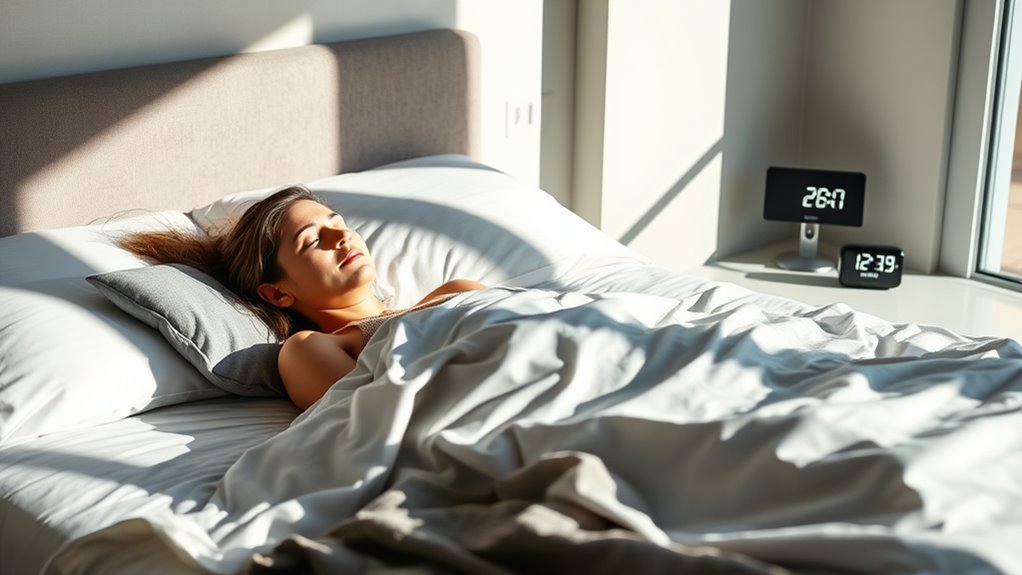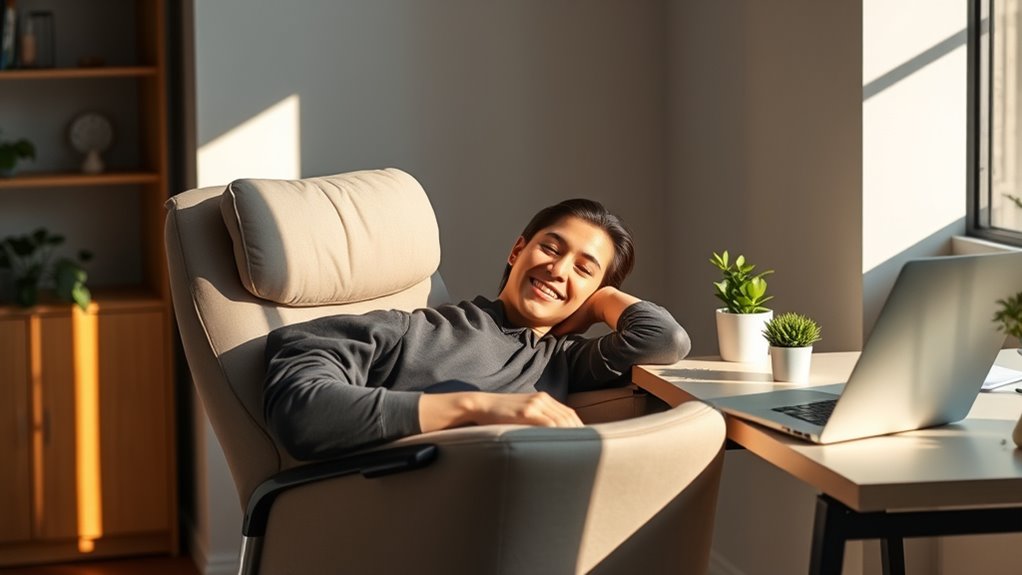For a quick energy boost, stick to power naps of 10-20 minutes, staying within lighter sleep stages to wake feeling refreshed. If you want to enhance creativity and problem-solving, aim for a 60-minute nap that reaches deeper sleep stages, but be aware of possible grogginess. To fully reset and tap into your mental sharpness, a 90-minute nap covering a complete sleep cycle is ideal. Keep exploring to discover how to optimize your nap for your goals.
Key Takeaways
- Short naps (10-20 mins) boost alertness and energy by staying within light sleep stages.
- Longer naps (60 mins) support memory and problem-solving but may cause grogginess initially.
- Full cycle naps (90 mins) promote complete sleep, enhancing creativity and cognitive resets.
- Timing naps early afternoon maximizes benefits and avoids disrupting nighttime sleep.
- Match nap length to goals: quick energy for short naps, cognitive and creative boosts for longer ones.

Have you ever wondered how a quick nap can boost your energy and productivity? It turns out, understanding sleep cycles and nap durations is key to maximizing these benefits. When you nap, your body goes through different sleep stages—light sleep, deep sleep, and REM sleep. These stages are part of your sleep cycles, which typically last about 90 minutes. The goal with power napping is to hit just the right part of these cycles, so you wake up feeling refreshed rather than groggy. Shorter naps, usually around 10 to 20 minutes, keep you in the lighter stages of sleep, making it easier to wake up and feel energized. These quick bursts are perfect for boosting alertness and focus without dipping into deep sleep, which can leave you feeling disoriented and sluggish if interrupted.
On the other hand, if you’re aiming to enhance creativity or memory consolidation, slightly longer naps—around 60 minutes—can be more beneficial. This duration allows your brain to enter deeper sleep stages, where important processing and problem-solving happen. However, waking up from deep sleep can sometimes leave you feeling a bit foggy initially, so timing is essential. A 90-minute nap, matching a full sleep cycle, often provides a sweet spot, letting you complete a cycle and wake up naturally, feeling more rested and mentally sharp. This length is ideal if you need a significant mental reset or are looking to tap into your creative potential. Additionally, understanding sleep architecture can help you choose the most effective nap length for your needs.
Your choice of nap duration depends on your goals. Shorter naps are best for quick energy boosts, helping you stay alert for work or study. Longer naps, on the other hand, support cognitive functions like problem-solving and creative thinking, making them perfect during weekends or days off when you have more time to relax. Timing your nap to your body’s natural sleep cycles also matters. For example, early afternoon is typically when your body experiences a natural dip in energy—ideal for a power nap. Avoid napping too late in the day, as it can interfere with your nighttime sleep patterns.
Frequently Asked Questions
How Does Power Napping Affect Long-Term Memory Retention?
Power napping can boost your long-term memory retention by enhancing memory consolidation processes. When you nap, your brain actively processes and stores information, strengthening neural connections vital for recall. Regular short naps support brain health by reducing stress and promoting cognitive function. By incorporating power naps into your routine, you give your brain a chance to solidify memories, which benefits your overall learning and long-term retention efforts.
Can Power Naps Improve Athletic Performance?
You might find that power naps can boost your athletic performance if you practice good sleep hygiene and use effective napping techniques. Short naps, around 20 minutes, help enhance alertness and reaction times, which are essential for sports. Incorporate consistent napping routines and create a comfortable environment to maximize benefits. These strategies support quicker recovery and improved focus, ultimately helping you perform better during training and competitions.
Does the Ideal Nap Length Vary by Age?
You might find that the perfect nap length varies with your age, reflecting different age-related sleep needs. Younger individuals often benefit from shorter naps to boost alertness, while older adults may need longer naps to recharge fully. Generational nap habits also influence your preferences; some generations prioritize quick power naps, while others embrace longer rest periods. Adjust your nap length based on your age and personal sleep requirements for ideal refreshment.
Are There Specific Times of Day Best for Power Naps?
Timing typically trumps technique when it comes to power naps. You’ll find the best benefits in mid-morning or early afternoon, when your energy dips and sleep quality drops. Creating a calm, quiet nap environment boosts relaxation, making your nap more restorative. Avoid late-day naps that can interfere with nighttime sleep. Prioritize consistent, well-timed naps to maximize energy and creativity, ensuring your rest rejuvenates rather than disrupts your daily rhythm.
How Do Power Naps Influence Stress Levels and Mental Health?
Power naps can markedly reduce stress levels and boost mental clarity, helping you feel more refreshed and focused. When you take a short nap, your body releases stress-reducing hormones, which lower anxiety. This quick rest also clears your mind, improving concentration and mood. Regular power napping supports mental health by providing moments of relaxation amidst busy schedules, making it easier to handle daily pressures and maintain emotional balance.
Conclusion
Power napping can boost your energy and spark creativity, but timing matters. Did you know that a 10-20 minute nap can improve alertness without causing grogginess? That’s enough to refresh your mind and boost productivity. So, next time you feel sluggish or stuck, try a quick power nap of the ideal length. You’ll be surprised how a simple rest can transform your focus and inspire new ideas—just a short snooze away from your best work.









